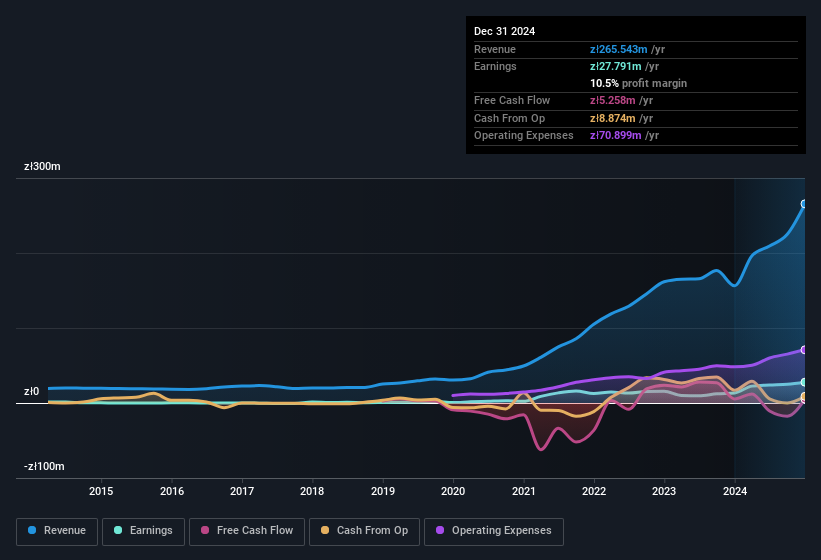Despite announcing strong earnings, Hub.Tech SA's (WSE:HUB) stock was sluggish. Our analysis uncovered some concerning factors that we believe the market might be paying attention to.
See our latest analysis for Hub.Tech

To understand the value of a company's earnings growth, it is imperative to consider any dilution of shareholders' interests. As it happens, Hub.Tech issued 43% more new shares over the last year. That means its earnings are split among a greater number of shares. To celebrate net income while ignoring dilution is like rejoicing because you have a single slice of a larger pizza, but ignoring the fact that the pizza is now cut into many more slices. Check out Hub.Tech's historical EPS growth by clicking on this link.
A Look At The Impact Of Hub.Tech's Dilution On Its Earnings Per Share (EPS)
As you can see above, Hub.Tech has been growing its net income over the last few years, with an annualized gain of 120% over three years. But EPS was only up 54% per year, in the exact same period. And at a glance the 107% gain in profit over the last year impresses. But in comparison, EPS only increased by 45% over the same period. So you can see that the dilution has had a fairly significant impact on shareholders.
In the long term, earnings per share growth should beget share price growth. So Hub.Tech shareholders will want to see that EPS figure continue to increase. However, if its profit increases while its earnings per share stay flat (or even fall) then shareholders might not see much benefit. For the ordinary retail shareholder, EPS is a great measure to check your hypothetical "share" of the company's profit.
Note: we always recommend investors check balance sheet strength. Click here to be taken to our balance sheet analysis of Hub.Tech.
Our Take On Hub.Tech's Profit Performance
As we discussed above, Hub.Tech's dilution over the last year has a major impact on its per-share earnings. For this reason, we think that Hub.Tech's statutory profits may be a bad guide to its underlying earnings power, and might give investors an overly positive impression of the company. Nonetheless, it's still worth noting that its earnings per share have grown at 54% over the last three years. The goal of this article has been to assess how well we can rely on the statutory earnings to reflect the company's potential, but there is plenty more to consider. With this in mind, we wouldn't consider investing in a stock unless we had a thorough understanding of the risks. When we did our research, we found 2 warning signs for Hub.Tech (1 is a bit unpleasant!) that we believe deserve your full attention.
This note has only looked at a single factor that sheds light on the nature of Hub.Tech's profit. But there is always more to discover if you are capable of focussing your mind on minutiae. Some people consider a high return on equity to be a good sign of a quality business. While it might take a little research on your behalf, you may find this free collection of companies boasting high return on equity, or this list of stocks with significant insider holdings to be useful.
Mobile Infrastructure for Defense and Disaster
The next wave in robotics isn't humanoid. Its fully autonomous towers delivering 5G, ISR, and radar in under 30 minutes, anywhere.
Get the investor briefing before the next round of contracts
Sponsored On Behalf of CiTechValuation is complex, but we're here to simplify it.
Discover if Hub.Tech might be undervalued or overvalued with our detailed analysis, featuring fair value estimates, potential risks, dividends, insider trades, and its financial condition.
Access Free AnalysisHave feedback on this article? Concerned about the content? Get in touch with us directly. Alternatively, email editorial-team (at) simplywallst.com.
This article by Simply Wall St is general in nature. We provide commentary based on historical data and analyst forecasts only using an unbiased methodology and our articles are not intended to be financial advice. It does not constitute a recommendation to buy or sell any stock, and does not take account of your objectives, or your financial situation. We aim to bring you long-term focused analysis driven by fundamental data. Note that our analysis may not factor in the latest price-sensitive company announcements or qualitative material. Simply Wall St has no position in any stocks mentioned.
About WSE:HUB
Flawless balance sheet and fair value.
Market Insights
Weekly Picks

Early mover in a fast growing industry. Likely to experience share price volatility as they scale


A case for CA$31.80 (undiluted), aka 8,616% upside from CA$0.37 (an 86 bagger!).


Moderation and Stabilisation: HOLD: Fair Price based on a 4-year Cycle is $12.08
Recently Updated Narratives


Positioned to Win as the Streaming Wars Settle

Meta’s Bold Bet on AI Pays Off

ADP Stock: Solid Fundamentals, But AI Investments Test Its Margin Resilience
Popular Narratives


Crazy Undervalued 42 Baggers Silver Play (Active & Running Mine)


NVDA: Expanding AI Demand Will Drive Major Data Center Investments Through 2026


The AI Infrastructure Giant Grows Into Its Valuation
Trending Discussion




